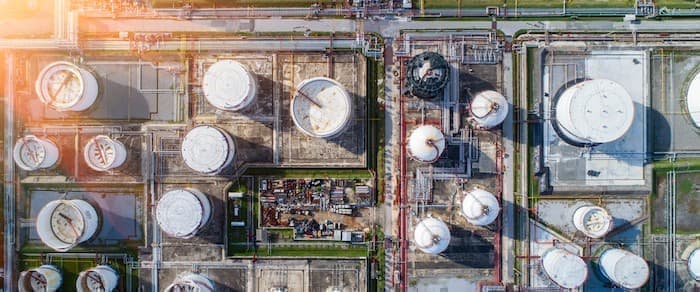The global refining industry has not recovered yet from the impact of the pandemic, but it is already facing longer-term challenges with the energy transition.
Over the next decade and a half, global fuel demand will likely decline, leading to an overcapacity in the refining market, lower margins, and lower utilization.
The outlook varies across regions. Generally speaking, however, some less efficient refineries will have to close because of downward pressure on profits amid lower demand and unnecessary high global capacity, McKinsey & Company said in its report ‘Global downstream outlook to 2035’ published this month.
The outlook examines global liquids demand in three different policy scenarios and the impact that demand would have on refiners globally and in various regions. The refining industry is likely to shrink in some regions, but it will still remain a large sector that would likely keep in the 2030s as much as 90 percent of its 2019 operating capacity, McKinsey & Company noted.
Just as with the recovery from COVID-19, the long-term prospects of the downstream sector will vary across scenarios and regions. There will be winners and losers.
Reference Case – 5 Million Bpd Refinery Closures, 35% Shrinking Value
McKinsey’s reference case, Energy Transition, in which future policies will follow current patterns, finds that Europe and the U.S. may need to shut down permanently as much as 5 million barrels per day (bpd) of capacity by 2035. Roughly half of those closures have already been announced, the company said.
In McKinsey’s Energy Transition scenario, global liquids demand peaks in 2029 at 104 million bpd, with road transport fuels peaking in 2023. Refining margins are set to recover once refinery rationalization occurs, but U.S. and European margins will be around $2 a barrel lower in 2031–2035 than in recent history. If energy and climate policies follow current patterns, the value of global refining is set to drop by 36 percent from 2015–19 levels by the 2030s, with the 2031–35 global average at $100 billion. During the 2030s, only Asia and the Middle East will see its refining industry grow in value, according to McKinsey.
This assessment is generally in line with previous estimates from other energy experts and consultants who say that Asia and the Middle East, especially the newer integrated refining complexes, will beat older refineries in countries where fuel demand is expected to be less resilient in the energy transition.
If the global refinery industry doesn’t see extensive further rationalization, the sector may never return to 80 percent capacity utilization, Wood MacKenzie said earlier this month.
The current crisis is an existential threat to smaller and less efficient refineries in Europe and Asia that were struggling to turn profits even before the pandemic. Even oil majors acknowledge that some sites have become permanently uneconomical amid depressed refining margins, fierce regional competition, and expectations of declining road fuel demand in the long term. For example, ExxonMobil and BP announced in the span of just a few months closures of their respective refineries in Australia. They now plan to convert them into fuel import terminals.
According to McKinsey, while Europe and the U.S. could recover faster from the pandemic impact in the short term, Asia’s refiners will be more resilient in the long term. As a whole, the reference case found that the industry will remain a large one, but it will become less profitable.
Delayed Transition To Grow Refinery Value To $181 Billion
If economic recovery from COVID takes precedence over emissions reduction and the energy transition slows down, global liquids demand will continue to grow through 2035, with light product demand peaking in 2029, McKinsey says.
Related: Could This Be The Most Promising Oil Play Of The Decade?
Utilization will remain strong, and Asia and the Middle East will even add 1.3 million bpd of capacity. Asia and the Middle East will also drive a 16 percent rise in value in the refining industry to a global average of $181 billion in 2031–2035.
Accelerated Transition To Lead To 16 Million Bpd Refinery Closures
ADVERTISEMENT
If the transition accelerates, it would bring about peak global liquids demand in 2024 at 101 million bpd, while light product demand will never recover to 2019 levels, McKinsey’s analysis shows. In this case, all markets, especially Europe and the United States, would require as much as 16 million bpd of unannounced closures by 2035. In this case, the value of the refining industry would plunge in the 2030s to 74 percent compared with 2015–2019 levels, at $40 billion global average in 2031–2035.
The actual scenario that will unfold could be close to the reference case or a combination of two or three of those examined by McKinsey.
At any rate, some things are certain—refiners will take time to overcome the COVID-19 shock. At the same time, they will be bracing for the long-term impact of the energy transition. Refiners should be ready to adapt to lower long-term refining margins, industry rationalization with millions of bpd of capacity closures, and a long-term decline in profits.
By Tsvetana Paraskova for Oilprice.com
More Top Reads From Oilprice.com:
- Huge Dividend Cripples World’s Largest Oil Company
- The Ongoing Transformation Of ‘Big Oil’
- U.S. Gasoline Demand In 2021 May Have Peaked Already


















